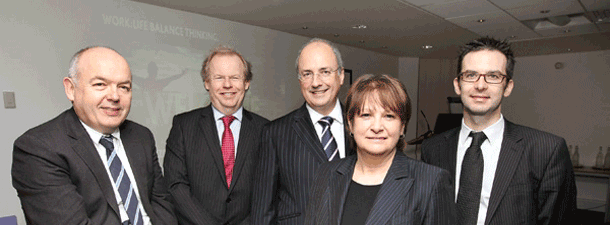Two-way flexibility between employers and employees over working time arrangements – and other flexible working practices – is the backbone to achieving work:life balance and maximising the chances of business survival, according to research by a leading international social science research centre.
The Warwick Institute for Employment Research (IER) is a global leader in research into the labour market. It has conducted a research programme into employers’ skills needs, HR policies, and the development of work:life balance over the last three decades focusing on the opportunities for employers and employees to benefit by adopting the latest thinking and practices.
Terence Hogarth, Principal Research Fellow at IER was keynote speaker at a recent Work:Life Balance seminar hosted by Midlands’ law firm Challinors. He explained:
“Work:life balance is an essential element of high performance work practices, founded on a mutual respect between employers and employees over the need for flexible working time arrangements, but it will only work where other policies are in place that secure employees’ commitment and motivation.
“Given the depth of the recession and competitive pressures companies are likely to face in the recovery period, they should recognise the work:life balance as an essential ingredient to recovery and survival, as our evidence suggests.”
The Institute’s recent study indicates both employers and employees have identified real value in initiatives that support work:life balance, as Mr Hogarth explained: “94 percent of workers say that people work best when able to balance work and the rest of their lives, with 89 percent saying it improves work place morale. Employers think it makes for a happier workforce, improved staff retention and motivation, and has a positive impact on employee relations, recruitment and financial performance.
“Investments in the workforce are potentially less constrained compared with capital investments at this time and the evidence suggests that they have substantial scope to improve organisational performance. Work-life balance is one of those investments. Companies have used work:life balance policies to ensure they can hold onto much valued employees during a downturn, by offering extended career breaks, reduced hours, and flexible working.”
The event marked the official launch of a new service from Challinors, iValue, which the firm’s chief executive Andy Hodges says is: “Our latest innovative approach towards supporting employers by providing a free, comprehensive added-value legal facility for staff.”
Additional recent research* indicates that 50 percent of SME owner managers in the UK say the state of the economy is taking its toll on their personal life, whilst 29 percent feel their work:life balance has deteriorated.
Copies of all the presentations from the Work:Life Balance seminar are available on-line:
https://ivalue.challinors.co.uk/Launch.aspx





















